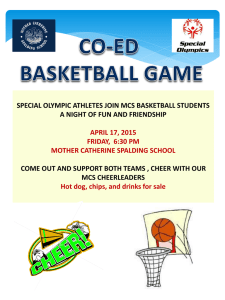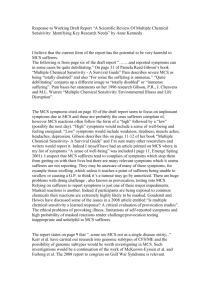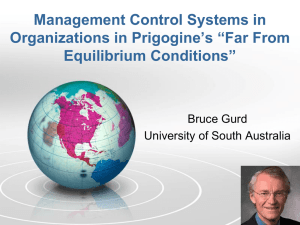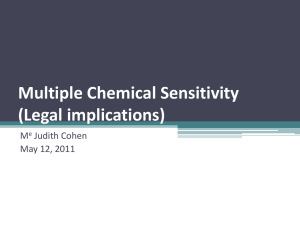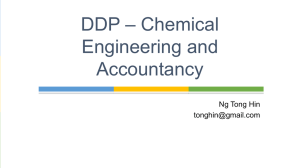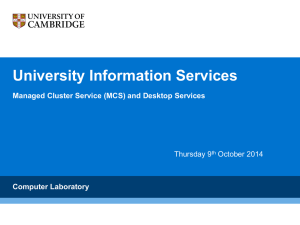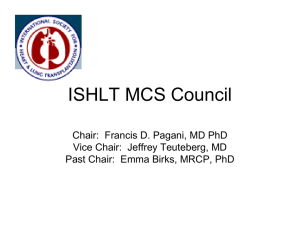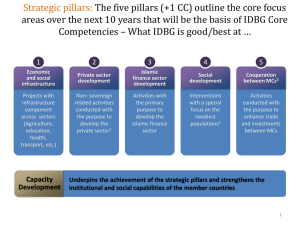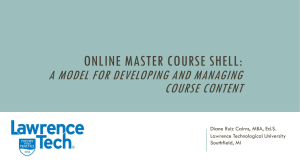Breakspear anonymised
advertisement
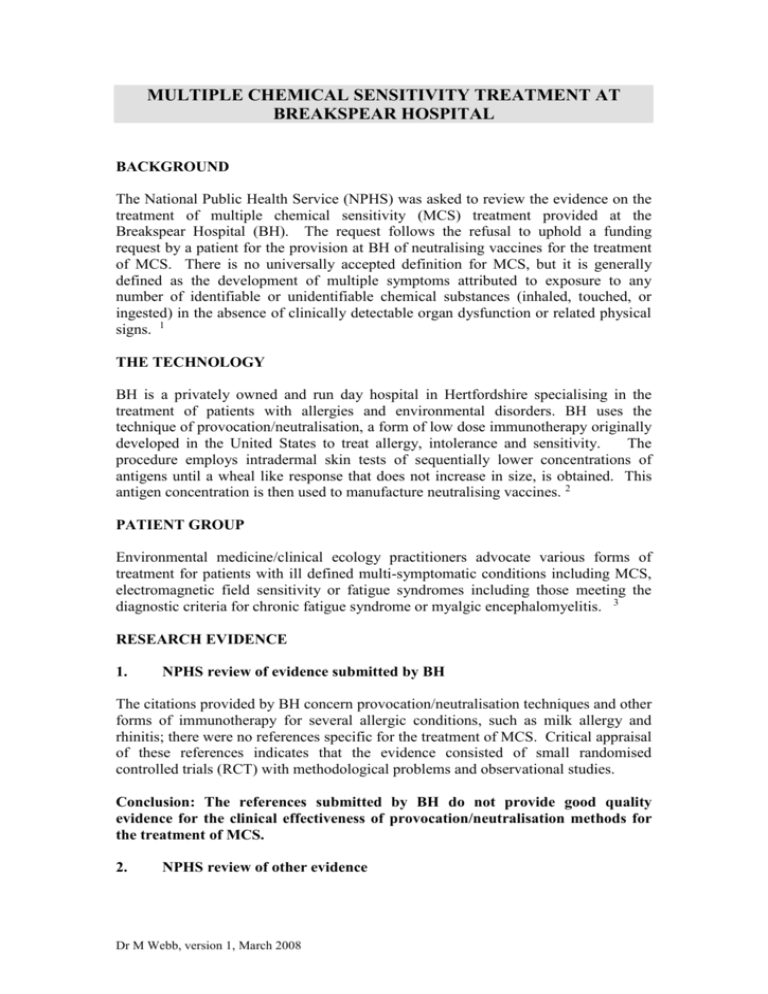
MULTIPLE CHEMICAL SENSITIVITY TREATMENT AT BREAKSPEAR HOSPITAL BACKGROUND The National Public Health Service (NPHS) was asked to review the evidence on the treatment of multiple chemical sensitivity (MCS) treatment provided at the Breakspear Hospital (BH). The request follows the refusal to uphold a funding request by a patient for the provision at BH of neutralising vaccines for the treatment of MCS. There is no universally accepted definition for MCS, but it is generally defined as the development of multiple symptoms attributed to exposure to any number of identifiable or unidentifiable chemical substances (inhaled, touched, or ingested) in the absence of clinically detectable organ dysfunction or related physical signs. 1 THE TECHNOLOGY BH is a privately owned and run day hospital in Hertfordshire specialising in the treatment of patients with allergies and environmental disorders. BH uses the technique of provocation/neutralisation, a form of low dose immunotherapy originally developed in the United States to treat allergy, intolerance and sensitivity. The procedure employs intradermal skin tests of sequentially lower concentrations of antigens until a wheal like response that does not increase in size, is obtained. This antigen concentration is then used to manufacture neutralising vaccines. 2 PATIENT GROUP Environmental medicine/clinical ecology practitioners advocate various forms of treatment for patients with ill defined multi-symptomatic conditions including MCS, electromagnetic field sensitivity or fatigue syndromes including those meeting the diagnostic criteria for chronic fatigue syndrome or myalgic encephalomyelitis. 3 RESEARCH EVIDENCE 1. NPHS review of evidence submitted by BH The citations provided by BH concern provocation/neutralisation techniques and other forms of immunotherapy for several allergic conditions, such as milk allergy and rhinitis; there were no references specific for the treatment of MCS. Critical appraisal of these references indicates that the evidence consisted of small randomised controlled trials (RCT) with methodological problems and observational studies. Conclusion: The references submitted by BH do not provide good quality evidence for the clinical effectiveness of provocation/neutralisation methods for the treatment of MCS. 2. NPHS review of other evidence Dr M Webb, version 1, March 2008 The NPHS performed a rapid review of the evidence using previously described methodology. 4 5 2.1 Evidence for the existence of MCS as a clinical entity Many theories both immunological and non-immunological have been proposed for the aetiology of MCS. These theories are all hampered by the absence of a consistent dose response to proposed causative substances and consistent objective evidence of systemic inflammation, cytokine excess, or immune system activation in relation to symptoms is lacking. 1 6 Examination of the evidence for the existence of MCS revealed that high quality evidence is lacking 6 7 8, although some countries such as Denmark and the United States do have position statements on MCS. Furthermore it has been reported that MCS cannot be explained by allergy and/or immunological mechanisms and there is convincing evidence that the ‘condition’ can be explained by psychological conditioning and the presence of psychiatric disorders. 9 10 11 12 13 It should be acknowledged however, that this group of patients do present with considerable symptomology and should therefore receive appropriate care through NHS services. Such services have been the subject of reports detailing improvements required to deliver comprehensive allergy services. 14 15 Conclusion: There is a lack of good quality evidence to support the existence of MCS as a clinically distinct syndrome or disease. 2.2 Provocation/neutralisation techniques Three comprehensive reviews for the provocation/neutralisation treatment of MCS and related disorders provided at BH in 2004 concluded that there is a lack of good quality scientific evidence to support the use of provocation/neutralisation methods. 16 17 18 A 2006 update of the review of the evidence indicated that despite repeated searches the results have confirmed an absence of RCT evidence on the use of this therapy for MCS, multiple allergy syndrome and chronic fatigue syndrome. 19 A review of 37 provocation studies in MCS concluded that persons with MCS do react to chemical challenges, but these responses occur when they can detect differences between active and sham substances, suggesting that the mechanism of action is not chemical specific but is related to prior beliefs and expectations. 9 There are RCTs on provocation/ neutralisation techniques in conditions like asthma, eczema and hay-fever but it is debatable whether findings from these studies can be reasonably used to underpin treatment in more complex and ill-defined disorders. A systematic review for the use of provocation/neutralisation testing and therapy for food allergy and other sensitivities indicated that there was no evidence to suggest that provocation/neutralisation techniques are useful. 20 It should be noted that Dr Monro, the Director of BH, provided information to and commented on the draft of the latter report. Dr Monro also gave evidence to the House of Lords Select Committee on Science and Technology in 2007 whose report on allergy was published in 2007. With regard to immunotherapy the Committee suggested that immunotherapy may be cost effective for some conditions such as allergic rhinitis and recommended that large well controlled trials are required to validate this. No recommendations were made on provocation/neutralisation techniques. 15 Dr M Webb, version 1, March 2008 Conclusion: There is a lack of good quality evidence to support the use of provocation testing and neutralising vaccines in the treatment of MCS. COST EFFECTIVENESS The search did not reveal any evidence on cost effectiveness of provocation/neutralisation treatment for MCS. One cohort study from Canada studied the impact of a multidisciplinary approach to the management of patients with MCS on health care utilisation costs. There was a relative decrease in the years following the initial consultation at the treatment centre of visits to general practitioners and secondary care. ONGOING RESEARCH No relevant trials were identified REFERENCES 1 The Merck Manuals. Multiple Chemical Sensitivity Syndrome(Idiopathic Environmental Intolerance). Merck Manual 2005. Available at: http://www.merck.com/mmpe/sec22/ch334/ch334c.html. Accessed 12th March 2008. 2 Breakspear Hospital. National Public Health Service 2004, unpublished. 3 Breakspear Medical Group Ltd. Multiple chemical sensitivity. Available at: http://www.breakspearmedical.com/files/multiple_chemical_sensitivity.html. Accessed 11th March 2008. 4 National Public Health Service. Evidence Checklist. Available at: http://www.nphs.wales.nhs.uk. Accessed 10th March 2008. 5 National Public Health Service for Wales. Overview of the evidence on effective service models in chronic disease management. Cardiff: NPHS; 2005. Available at http://wales.gov.uk/topics/health/publications/health/reports/internatoverviewchronicdisease?lang=en. Accessed 10th March. 6 Corabian P; Harstall C. Multiple chemical sensitivity: etiology, epidemiology, diagnosis, and treatment (Structured abstract). Health Technology Assessment Database 2008; Issue 1. 7 Somerville M. Effects of desensitisation treatments and clinical ecology for multiple chemical sensitivity and related disorders (Structured abstract). Health Technology Assessment Database 2008;:Issue 1. 8 Health Council of the Netherlands. Multiple Chemical Sensitivity. The Hague. Health Council of the Netherlands. 1999; Publication Number 1999/01. Available at: http://www.gr.nl/samenvatting.php?ID=381&highlight=multiple%20chemical%20sensitivity. Accessed 20th March 2008. 9 Das-Munshi J; Rubin GJ; Wessely S. Multiple chemical sensitivities: A systematic review of provocation studies. Journal of Allergy & Clinical Immunology 2006 ;118:1257-64. 10 Bornschein S; Hausteiner C; Zilker T et al. Psychiatric and somatic disorders and multiple chemical sensitivity (MCS) in 264 ‘environmental patients’. Psychological Medicine; 2002; 32: 1387-1394 11 Forsthovel C; Kaspers FA; Bailer J. Psychological correlates of multiple chemical sensitivity (MCS) and possible psychological causes. [German]. Zeitschrift fur Klinische Psychologie und Psychotherapie 2007;36(3):198-206. 12 Eis D, Muhlinghaus T, Birkner N, Dietel A, Eikmann T, Gieler U, et al. The German multicenterstudy on multiple chemical sensitivity (MCS) - Results from phase II. [German]. Umweltmedizin in Forschung und Praxis 2005;10:359-76. 13 Dietel A; Jordan L; Muhlinghaus T et al. Psychiatric disorders of environmental outpatients results of the standardized psychiatric interview (CIDI) from the German Multi-Center Study on Multiple Chemical Sensitivity (MCS). [German]. Psychotherapie Psychosomatik Medizinische Psychologie 2006 ;56:162-71. 14 Royal College of Physicians. Allergy: the unmet need. A blueprint for better patient care. A report of the Royal College of Physicians Working Party on the provision of allergy services in the UK. Royal College Physicians 2003. Dr M Webb, version 1, March 2008 15 House of Lords Health Select Committee on Science and Technology. Sixth Report 2007. Available at: http://www.publications.parliament.uk/pa/ld200607/ldselect/ldsctech/166/16602.htm. Accessed 16th March 2008. 16 Aggressive Research Intelligence Facility. The Breakspear Hospital. University of Birmingham 2003. Available at: http://www.arif.bham.ac.uk/pdfs/REP-report-breakspear.pdf. Accessed 14th march 2008. 17 Aggressive Research Intelligence Facility. Provocation- neutralisation Technique; Miller Technique; Multiple Allergy Syndrome; Multiple Chemical Sensitivity; Chronic Fatigue Syndrome; Candidal Hypersensitivity; Post-chemotherapy Fatigue. ARIF, University of Birmingham 2003. Available at: http://www.arif.bham.ac.uk/requests/p/provocation-neutralisation-miller-technique.htm. Accessed 14th March 2008 18 Forbes L. Update report: Effects of desensitisation treatments and clinical ecology for multiple chemical sensitivity and related disorders. In Bazian Ltd (Ed) STEER: Succinct and Timely Evaluated Evidence Reviews 2003; 3(8). Wessex Institute for Health Research & Development, University of Southampton. Available at: http://www.signpoststeer.org. Accessed 10th March 2008. 19 Aggressive Research Intelligence Facility. The Breakspear Hospital. University of Birmingham 2006. Available at: http://www.arif.bham.ac.uk/pdfs/REP-report-breakspear.pdf. Accessed 14th march 2008. 20 Dretzke J; Song F. Provocation-neutralisation testing and therapy for food allergy. West Midlands Health Technology Assessment Collaboration Report. University of Birmingham 2003. Available at: http://rep.bham.ac.uk/pdfs/2004/food_allergy.pdf. Accessed 18th March 2008. Dr M Webb, version 1, March 2008
